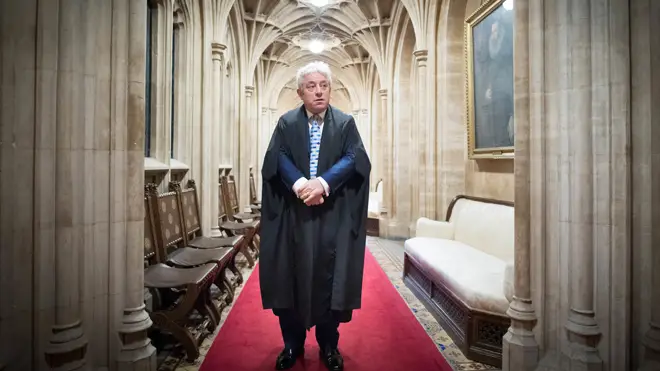
Iain Dale 7pm - 10pm
4 November 2019, 14:08

One of the final acts of this Parliament will be one of the most defining for the next.
This afternoon, MPs begin the process of electing John Bercow’s successor as Speaker. After 10 years in the chair, Mr Bercow has become a minor celebrity in his own right.
But the role of Speaker is about much more than colourfully reprimanding MPs and seeing how many extra vowels can be inserted into the word “order”.
The Speaker is the highest authority in the House of Commons, and has considerable power in determining how the business of the House is conducted.
Follow all the developments LIVE here
For proof of this, you need only think back to the numerous controversies around Brexit amendments in recent months, in which Mr Bercow was either condemned for tearing up the rules, or praised for defending the interests of Parliament, depending on your political persuasion.
What’s more, the Speaker chairs the House of Commons Commission, responsible for the appointments, salaries and management of all House of Commons staff.
Mr Bercow’s successor will thus have ultimate responsibility for cleaning up Parliament, amid allegations of a culture of bullying and harassment.
So today’s decision will be being weighed heavily by MPs. As I write, they are spending the afternoon in a drawn out election process. They vote in rounds, by secret ballot. If somebody gets 50% of the vote, they are immediately elected. If not, the candidate with the lowest number of votes, or anyone with under 5% is eliminated, and MPs vote again, until somebody has 50% support, or is the last one standing.
This morning, there were seven candidates in the running. Here are the bookies' top four:
The hot favourite is Sir Lindsey Hoyle, a Labour MP who has been the most senior Deputy Speaker (or in Commons-speak, the Chairman of Ways and Means) since 2010.
Sir Lindsay is certainly more understated than his predecessor, but after the Bercow years that may prove part of his appeal. Over years in the chair, he has led debates with skill and humour, and crucially, without making many enemies along the way.
Hot on his heels is Labour grandee Harriet Harman, the longest-serving female MP, having first been elected in 1982. She is seen more as the “continuity Bercow” candidate, praising Mr Bercow’s actions in the Brexit debates. She is also perceived as quite a tribal Labour politician, and may struggle to get the necessary votes from Conservative MPs.
The third contender is another Deputy Speaker, Conservative MP Eleanor Laing. Like Sir Lindsay, she has been playing up her credentials as a safe and experienced pair of hands after the Bercow experiment. As the only Scot standing for the role, she has sought SNP support, promising to give “greater weight to the third party” in debates. If her charm offensive has worked, those votes might prove crucial.
Initially an outsider, Labour MP Chris Bryant has been making a late surge. A proper procedure boffin, Mr Bryant claims to keep a copy of Parliament’s Standing Orders by his bed, and few have a better grasp of the Parliamentary rule book, known as Erskine May.Although he is a Labour MP, he is thought to have the backing of some key Conservatives, notably Michael Gove, which might put him in a better position than rival Harriet Harman.